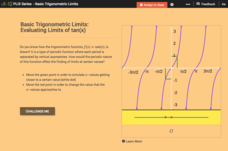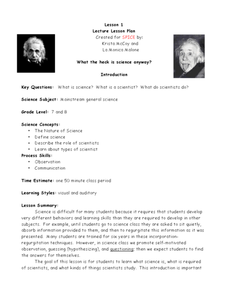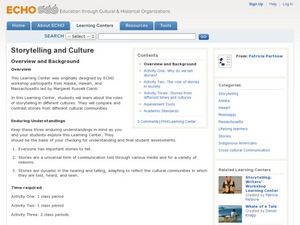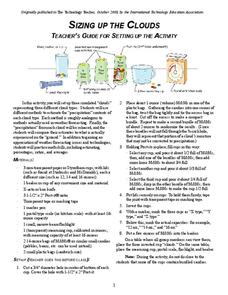CK-12 Foundation
Properties of a Normal Distribution: Uniform Distributions
There's nothing normal about an extraordinary resource. Scholars change the dimensions of a normal distribution using a slider interactive. Determining the area under the graph gives probabilities for different situations.
CK-12 Foundation
Sampling Distribution of a Sample Mean: The Mean of the Average Ages
What does it mean to take the mean of the mean? An easy-to-use interactive has users adjust the mean ages of different samples. Finding the average of these sample means gives an estimate of the population mean.
CK-12 Foundation
Mode: Mucho Money
Generate stacks of money. Given bills of different denominations, pupils stack them based on their values. The learners figure out which value is the mode of the data and determine whether the data is unimodal, bimodal, or multimodal.
CK-12 Foundation
Coefficient of Variation: Diverse Populations
What is the height of school clubs? Learners use sliders to calculate the coefficient of variation for three different school groups. Using the calculations, class members compare the variation in the heights of the groups.
CK-12 Foundation
Basic Trigonometric Limits: Evaluating Limits of tan(x)
Chase a periodic moving limit. Learners graphically determine the limit of the tangent function at different input values. Using sliders, pupils find out whether the tangent function approaches the same value from the left and the right....
CK-12 Foundation
Method of Cylindrical Shells
Approximate the volume of a solid of revolution. Using a method similar to approximating the area under a curve, pupils investigate the volume of a solid of revolution. The learners use a given definite integral to find the volume of...
CK-12 Foundation
Sums of Geometric Series
Geometric series either get bigger or approach a single number. So, how do you know which it is? An interactive presents three different geometric series with varying common ratios. With the aid of patterns, pupils determine values of r...
CK-12 Foundation
Fractions as Percents: Baking Cookies
A five-question interactive challenges mathematicians to solve word problems involving fractions as percents. Baking two different types of cookies and needing the exact amount requires scholars to make fractions, turn them into...
National Endowment for the Humanities
Life Before the Civil War
American life before the Civil War was very different from American life today. To show this difference in a full spectrum, learners compare two communities that illustrate the differences between Northern and Southern life. Throughout...
Serendip
Vitamins and Health – Why Experts Disagree
Should people take vitamins or get the needed minerals through diet? Experts disagree based on many different factors. Scholars compare study findings and discuss the differences. They learn the importance of comparing results across...
Curated OER
Plant Groups
Compare different types of leaves in a science exploration. First, third graders identify common characteristics of various plants, such as daisies, fir needles, and cypress leaves. They then determine if the plants in each group are...
Curated OER
Life Reflections in Songwriting and Poetry
Students analyze, discuss and compare sources of inspiration, use of words and imagery, and other differences in writing styles between two featured songwriters. This is an introductory lesson plan to a creative project unit.
Ellsworth American
Think About the Newspaper
Investigate the significance of adjectives with a newspaper activity that addresses effective language. Readers probe teacher-provided articles in search of the mighty modifiers, and practice by replacing them with a different word, and...
Curated OER
Good Apples
Students investigate diversity. In this diversity lesson, students look at a variety of apples in order to compare and contrast their physical characteristics. They apply the concept to people by listing how people are the same and...
Earth Day Network
Conserving Water Through Art!
Having fresh, clean drinking water is a privilege many people take for granted. Help raise awareness about the scarcity of water and the importance of conservation by discussing different ways water is used in everyday life. Brainstorm...
Equality and Human Rights Commission
Learning area 2: Challenging Stereotypes and Discrimination
Six powerful and eyeopening lessons provide scholars with activities designed to challenge stereotypes and discrimination. The unit provides reading material with which pupils read and discuss. Grand conversations lead to physically...
Chicago Botanic Garden
Climate Change Around the World
You know climate change is happening when you see a bee take off its yellow jacket. Part four in a series of five lessons explores all factors affecting climate change: temperature, cloud cover, precipitation, and carbon dioxide. By...
Curated OER
What the Heck Is Science Anyway?
Here is a 12-page outline of an introductory science lesson. The teacher lectures on what science is, the role of a scientists, different disciplines of science, and the impact of scientific discoveries. Detailed lecture notes are...
Curated OER
Storytelling and Culture
Students examine the cultural tradition of storytelling. In this storytelling activity, students explore stories from 3 different cultures and evaluate the roles that storytelling plays in each of the cultures to pass on values and beliefs.
Rainforest Alliance
Colombia Biodiversity
How diverse is the rainforest? How much more diverse is a rain forest than a temperate forest? Explore these focus questions in a lesson that explores the plants, animals, and insects in forests. After listening to a reading...
Curated OER
Families Eat Rice - Lesson Plan
Learners participate in a shared writing experience about rice. In this writing lesson, students listen to Norah Dooley's, Everybody Cooks Rice. They write about, and discuss different ways their families and those in the book use...
Curated OER
Cell Biology
Identify the different cell organelles in prokaryotes. Modelling the cells using Jell-o and candies will be a fun way to experience the cell in a hands-on way (different to using play-doh!). They observe cells under a microscope and draw...
International Technology Education Association
Sizing Up the Clouds
How much rain can that cloud make? Through a simulation, the class estimates the amount of candy rain contained in different cup clouds. After probing the clouds using different methods, class members adjust their estimates. Participants...
Normal Community High School
Classification of Matter
Steel is an example of homogeneous mixture, also called an alloy, which is made of iron and carbon. The presentation introduces learners to elements, compounds, and mixtures. They explore their similarities and differences, and then take...























